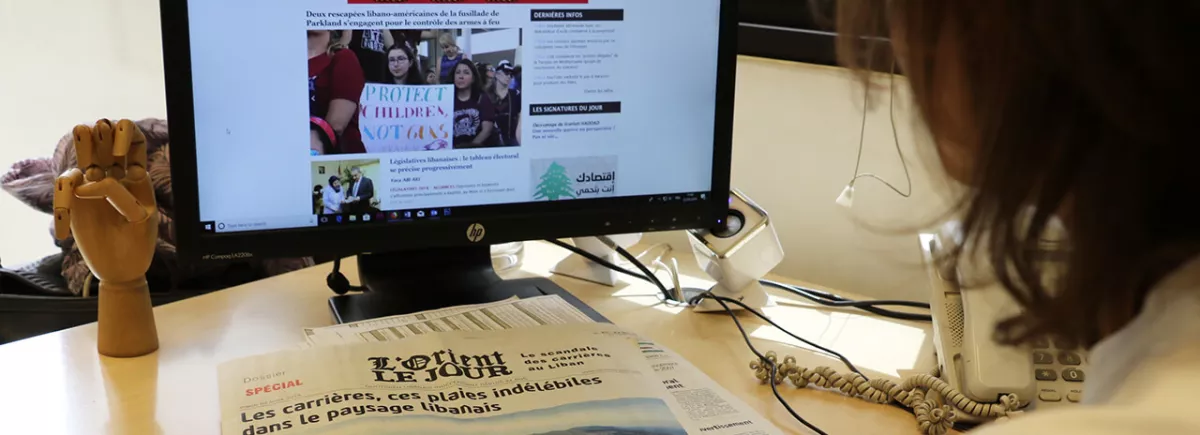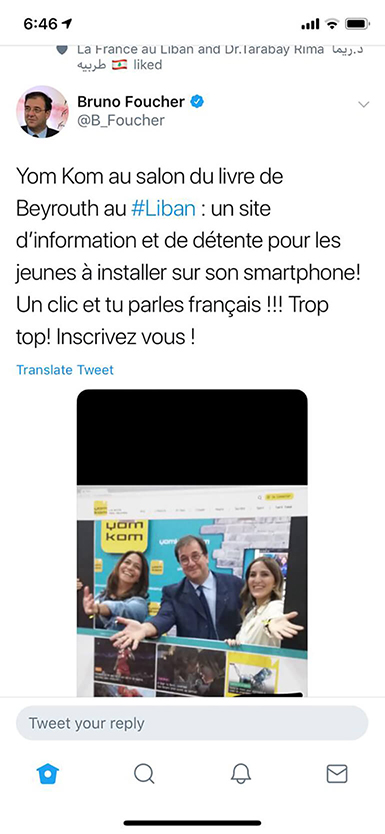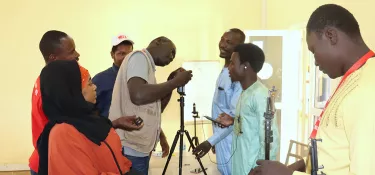
Digital East project evaluation
Related project
Digital EastTo help Lebanon's French-language press adapt to modern financial and technical realities, CFI ran the Orient numérique [Digital East] project between 2015 and 2018. When the project came to an end, a project evaluation was carried out by an independent firm. Summary of the results.
The Priority Solidarity Fund (FSP) Digital East project to support the restructuring of Lebanon's French-language press aimed to enhance the technical skills and capabilities of the French-language media in Lebanon, to help it adapt to professional and technical realities in a country facing particularly difficult economic, political and social challenges.
The collapse of Lebanon's advertising market (by 50% since 2012), which constitutes the main source of revenue for the media, has already led to the closure of two major Arabic-language Lebanese newspapers. The country is facing an economic crisis linked to the impact of falling oil prices in the Gulf countries, conflicts in the region, insecurity and the influx of refugees, who now represent over a quarter of the population.
Helping to expand Lebanon's digital output in French
The French-language media in the Arab world, traditionally less dependent on religious and political influences, helps to convey the values of the Francophone community as a means of driving development and integration in the global economy and of promoting freedom of expression and democratic participation.
It is facing, even more so than the Arabic-language media, major economic challenges linked to a fall in readership, a fall in advertising revenue, competition from Arabic newspapers, and the new ways in which people are consuming information, with the past twenty years seeing a turn away from printed media and towards digital consumption. Added to this is the rising influence of the English language, which has become the principal tool in professional activities and a common tool for communicating on social media.
The project's challenge lay in stabilising the turnover of the media outlets benefiting from the Digital East project through the development of digital journalistic output in three key ways: improving editorial staff organisation, increasing digital content production and access thereto, and adapting and implementing technical infrastructure.

The project was implemented by CFI from October 2015 to June 2018 and run by the French embassy in Beirut, with four objectives:
- Improving the ability to monetise access to content on specific platforms;
- Developing digital and printed editions, particularly aimed at the diaspora;
- Developing the marketing and social media strategy in order to increase, in particular, the readership aged 25-45;
- Developing editorial management tailored to digital output.
Initially, the project beneficiaries were the
L'Orient-Le Jour group and the Magazine group.
Following the withdrawal of the Magazine group during the first year – due to a change in its editorial policy – L'Orient Le Jour remained the main beneficiary of the project initiatives until the inclusion of the press group
Planet News Business, seven months before the end of the implementation period. The latter, which since 2014 had successfully developed the Arabic-language weekly newspaper Kel Yom aimed at 8- to 12-year-olds, wanted to launch editorial content in French and in Arabic for 14- to 18-year-olds.
This innovative project appeared to be entirely suited to the social and multilingual situation in the country. It enabled Digital East to widen its objectives and target a young audience.
A “tailored" approach, listening to the beneficiaries
Although part of a single project with common objectives, support for the press groups L'Orient Le Jour and Planet News Business was provided in parallel with different initiatives being implemented, in accordance with a “tailored" approach. CFI adopted a position of listening to the beneficiary media outlets and demonstrated flexibility, adapting the project initiatives and schedule to meet the challenges encountered. Diagnostic work was undertaken first, in conjunction with the beneficiary media outlets, which made it possible to target initiatives and define a plan of action.
 For L'Orient Le Jour, it seemed justified to focus modernisation efforts on the various editorial media (paper, online, social media) and to tackle the issue of links between content, formats and the organisation of online and print editorial departments.
For L'Orient Le Jour, it seemed justified to focus modernisation efforts on the various editorial media (paper, online, social media) and to tackle the issue of links between content, formats and the organisation of online and print editorial departments.
For Planet News Business, the focus was on supporting the creation of a new bilingual editorial project –
Yom Kom – through the definition of editorial content, definition of the economic model, and technical development of the site.
This approach, enabling long-term strategic issues to be tackled and adjustment to the specific characteristics and requirements of the beneficiaries (a “tailored" approach), distinguishes the Digital East project from other support projects in the sector, which are principally formed of stand-alone initiatives with no overall vision.
The focus on expanding digital output appeared entirely appropriate, given the weak presence of most Lebanese French-language media outlets on the Internet, the potential for monetisation of French-language content, and the widening of the readership.
Digital East helped to encourage reflection on digital output and the links to be created between online and printed formats. According to the two beneficiary media outlets, the project provided “ a new, more modern, more open, and more dynamic vision of the media". In spite of the challenges and difficulties faced, the project demonstrated adaptability, to continue to move in the right direction with regard to the initial objectives. This was greatly facilitated by CFI's efforts to maintain dialogue with its partners and undertake thorough follow-up and guidance work. The flexibility of the FSP must be acknowledged inasmuch as it enabled the project to evolve in an innovative manner.
Most of the outcomes and objectives achieved
There should be noted, among the main observations of the evaluation relating to support for L'Orient Le Jour, an initiative implementation rate of greater than 90%, which made it possible for most of the project's outcomes and objectives to be achieved.
The introduction of technical and management improvements enabled:
- digital output to be consolidated;
- human resources capabilities and allocation to be improved;
- lines of collaboration to be established between the online/print editorial departments and the economy section of L'Orient Le Jour and that of Le Commerce du Levant;
- the visual aspect of printed editions to be improved;
- a social media strategy to be defined;
- the online presence and visibility of L'Orient Le Jour to be improved.

These improvements contributed to a significant rise in subscriptions to the digital and printed output and, therefore, to a significant increase in online turnover.
For Planet News Business, the project enabled the creation of new editorial content for French-speaking and Arabic-speaking adolescents in the region. This was launched in November 2018 at the Beirut French-language book fair.
Digital East therefore seems to have largely met the expectations of the beneficiary media outlets and enabled the identified objectives to be achieved. However, the acute crisis which Lebanon currently faces is having a major impact on the possibilities of increasing funding sources and, consequently, on the ability of the two beneficiary media outlets to invest, which is necessary for their digital transition to continue.
The Digital Readings, project, run until December 2018, represents the continuation of the objectives of Digital East. It was intended to enhance French-language digital output, by offering support for four Lebanese (French-speaking and Arabic-speaking) media outlets providing journalistic content in French. The, Magazine group, Le commerce du Levant (L'Orient Le Jour's economic monthly) and Yom Kom have received support from this project.


